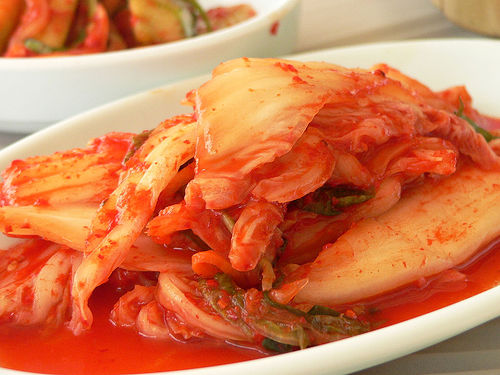
From a Korean father’s recent email to his daughter:
It is reported that the [swine] flu is spreading in Queens area, except for the Korean-American concentrated area. The reason is that kimchi bacteria kills swine flu bacteria. Kimchi is now very popular in China. Please have [Grandchild 1] and [Grandchild 2] eat kimchi.
Can anyone reading this tell me if swine flu is less of a problem in the Korean part of Queens than in other parts?
I hope so. I eat kimchi every meal and use the big glass bottles it comes in to make kombucha. Kimchi is indeed popular in my section of Beijing but I thought it was because of the Korean students. There are so many the neighborhood is called Koreatown. There is even a North Korean restaurant! Beijing is close to Korea — which is good, because I love Korean food.
Thanks to Paul Sas.
Flu is a virus that infects lungs and sinuses, not a bacteria in the GI track, so the details, at least, are nonsense.
Of course, there are reasonable mechanisms with which kimchi could protect you from infection. Seth’s working hypothesis is fairly popular recently. OTOH, this sounds like a clear example of “old persons’ bias”. Surely the old ways of our homeland are best; please make sure the youngin’s remember them (and us). Data would be nice, though.
Seth, does cooking or heating fermented foods kill the beneficial bacteria?
Dave, yes, cooking kills bacteria. What difference that makes is a harder question. Dead bacteria won’t help you digest your food. But dead bacteria, even in fragments, might well stimulate your immune system, just as dead viruses do.
According to https://flutracker.rhizalabs.com/, South Korea has 21 confirmed H1N1 cases and Japan (which also eats more Kimchi than the west along with natto) 388. Interestingly both countires are reactly more strongly than the western countries in closing schools, barring travel, etc…so the countries themselves don’t seem to believe that kimchi is the answer.
Of course, the data probably reflects the ability to detect the virus rather than the prevlance of it. The interesting question is whether the survival rate for the chronically ill (diabetes, immune deficiencies, etc.) with H1N1 is higher in Korea/Japan than in the US/Western Europe/Canada. The heath care systems are basically equally advanced but the diets are varied.
So I shouldn’t heat up my sauerkraut or put my kimchi in with a hot bowl of soup if I want live bacteria?
This is a classic case of “Old Wives’ Tales of the Old Country”.
We, Hungarians, are just as likely to do this as any other immigrant group.
michael vassar has no idea what he’s talking about.
First of all you need to consume ripe kimchi. How will you know if it’s ripe? It will be very soft and have a strong smell.
I am proof kimchi works for flus and colds. As a kid I ate plenty of ripe kimchi. If you stopped consuming ripe kimchi I would eventually catch the cold or flu. I only had 3 flu in my life and a few colds.
If it’s just raw kimchi it won’t do much it MUST be ripe, that’s when there’s load of friendly bacteria.
To say that the bacteria in Kimchi affects only the GI tract and therefore cannot help with respiratory viruses is ludicrous. The body is a whole, not separate, distinct regions. The GI tract is where the majority of elimination occurs. A healthy GI tract is vital for proper elimination of the body’s contaminants. Kimchi = healthy GI tract.
And obviously with people saying both the avian flu and swine flu probably originated in Asia, there will be a higher percentage of people sick with both those types despite their diets, just as antibiotics are not 100% effective. What would be more interesting would be the rates of exposure vs. the rates of infection amongst people who eat kimchi and people who do not.
You cannot dismiss the old ways just because they don’t fit with your current beliefs. Those beliefs lasted centuries because they probably worked for more people than you can fathom.